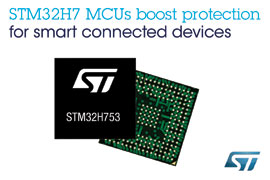– Platform Security Architecture (PSA) from Arm enhances support for cost-effective state-of-the-art security in the IoT world
– ST’s Arm® Cortex®-M7 based STM32H7 series MCUs combine PSA principles with advanced security features and services
November 1, 2017 – STMicroelectronics (NYSE: STM), a global semiconductor leader serving customers across the spectrum of electronics applications and a leading supplier of Arm-based microcontrollers (MCU) used in Internet-of-Things (IoT) devices, welcomes Platform Security Architecture (PSA) from Arm, announced today, as a major enabler for ubiquitous, best-in-class cyber security. ST’s STM32H7 high-performing MCUs are designed with the same security concepts as the PSA framework and combine these principles with STM32-family enhanced security features and services.
 People and organizations are increasingly dependent on connected electronic devices to manage time, monitor health, handle social interactions, consume or deliver services, maximize productivity, and many other activities. Preventing unauthorized interactions with these devices is essential to protecting identity, personal information, physical assets, and intellectual property. As the IoT grows in scope and pervasiveness, public safety and national security are also at stake. As device manufacturers must always innovate to beat new and inventive hacking exploits, PSA helps them implement state-of-the-art security cost-effectively in small, resource-constrained devices.
People and organizations are increasingly dependent on connected electronic devices to manage time, monitor health, handle social interactions, consume or deliver services, maximize productivity, and many other activities. Preventing unauthorized interactions with these devices is essential to protecting identity, personal information, physical assets, and intellectual property. As the IoT grows in scope and pervasiveness, public safety and national security are also at stake. As device manufacturers must always innovate to beat new and inventive hacking exploits, PSA helps them implement state-of-the-art security cost-effectively in small, resource-constrained devices.
“Security is a major priority to ensure the success of the IoT. Winning the confidence of end users — from individual consumers to businesses and government agencies – is critical to adoption,” said Michel Buffa, Microcontroller Division General Manager, STMicroelectronics. “PSA from Arm is making core security capabilities like device identity and over-the-air (OTA) updates more affordable and scalable for small autonomous IoT devices, and we’ve made it work with the existing security features of STM32 microcontrollers, including on our high-performing STM32H7 series.”
ST’s STM32H7 MCU devices integrate hardware-based security features including a True Random-Number Generator (TRNG) and advanced cryptographic processor, which will simplify protecting embedded applications and global IoT systems against attacks like eavesdropping, spoofing, or man-in-the-middle interception. In addition, secure firmware loading facilities help OEMs ensure their products can be programmed safely and securely, even off-site at a contract manufacturer or programming house. To enable secure loading, security keys and software services already on-board the MCU permit OEMs to provide manufacturing partners with already-encrypted firmware, making intercepting, copying, or tampering with the code impossible. This enables programming and authenticating the device to establish the root-of-trust mechanism needed for the device to be connected to the end-user’s network and remotely updated over the air (OTA) to apply security patches or feature upgrades throughout the lifetime of the device.
“Arm is working with our ecosystem to shift the economics of security with the introduction of PSA as a common industry framework for securing the next trillion connected devices,” said Paul Williamson, vice president and general manager, IoT Device IP, Arm. “The secure hardware blocks and firmware-loading services ST has embedded in the Cortex-M based STM32H7 series utilizes the Arm PSA principles to drive innovation in security for a broad range of applications, including communication gateways and connected objects.”






